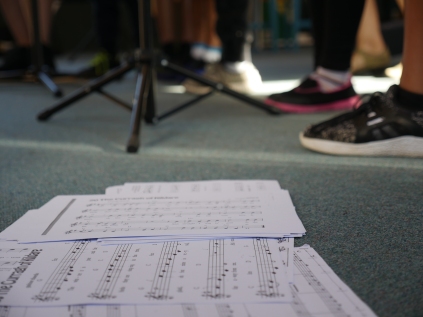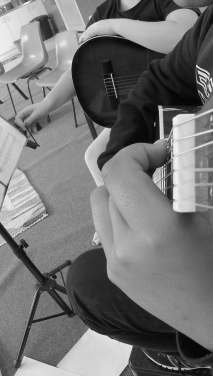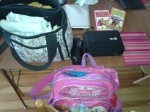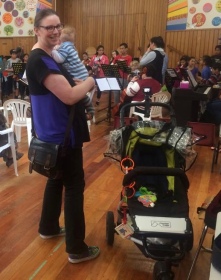This is a new website initiative from ANU Pacific Studies PhD students Bianca Hennessy (who I met in 2017 when she visited Va’aomanū Pasifika at Victoria University of Wellington as part of her doctoral research exploring Pacific Studies programmes around the region) and Mitiana Arbon. “The New Outrigger” is a space for “rigorous and academically informed dialogue, debate and conversation that brings together Pacific Islander and non-Islander scholars, activists, and artists. We want to explore the expansive transdisciplinary, Indigenous and Island(er)-centred, creative mode of studies that the Pacific inspires.” Well worth a look!
Category: Research
East Side Orchestras: Music and Social Change
I am currently working on a research project that looks at the social impacts of Arohanui Strings, Porirua Soundscapes, and Virtuoso Strings. These groups provide free, Sistema-inspired orchestral music education programmes in low decile schools in Hutt Valley and Porirua. This project is funded by the Royal Society of New Zealand’s Marsden Fund.

El Sistema is a Venezuelan music and social development initiative that began in 1975 and is today one of the world’s largest and most famous orchestral music education programmes. Sistema-inspired programmes operate in over 60 countries worldwide, including Aotearoa New Zealand, providing musical and social opportunities to underprivileged children with the aim of transforming their lives, their families’ lives, and their wider communities (Booth & Turnstall 2014, 2016; Sistema Global: Friends of El Sistema Worldwide 2015).
In the last decade, scholars have paid increasing attention to how Sistema-inspired programmes operate in different cultural contexts, reporting positive outcomes in musical and educational attainment, development of children’s personal and social skills (including discipline, positive attitudes towards school, and raised aspirations) and family engagement (Creech et al 2016; Osborne et al 2015; Trinick & McNaughton 2013). Fewer studies have focused on the wider social development aims of Sistema-inspired programmes, however, such as community wellbeing and socioeconomic impacts (Allan 2010; Burns & Bewick 2015; Uy 2012), and a growing number of researchers are critiquing orchestral music education programmes for promoting middle-class Western ideologies and for unintentionally reproducing rather than challenging structural inequalities (e.g., Baker 2014; Bull 2016). This is where my project comes in. I want to look beyond educational achievement to learn more about the social effects that Arohanui Strings, Virtuoso Strings, and Porirua Soundscapes have on the young people who participate in music classes, as well as their families and their wider communities. My aim is to understand how these groups transform young people’s lives through music.

I am using a range of ethnographic methods in this project, including interviews, participant-observation (attending rehearsals, concerts, holiday programmes, and other events), photography, and participatory video. This involves inviting some of the young people involved in these organisations to use video cameras to document their experiences, and collaborate with me on making a short ethnographic film – for example, by working with me to decide what should be in the film, shooting footage for it, and advising me during the editing process.
As well as making an ethnographic film showing how young people experience the relationship between music and social change, I will produce reports for Arohanui Strings, Virtuoso Strings, and Porirua Soundscapes. I will write academic journal articles and book chapters, and give a public talk at the end of the project (early 2020), and will upload published material here to this blog.
This research has been approved by the Victoria University of Wellington Human Ethics Committee, application reference 24293. If you have any questions about it, or are interested in becoming involved, please contact me.
References
Allan, J. 2010. Arts and the inclusive imagination: Socially engaged arts practices and Sistema Scotland. Journal of Social Inclusion, 1(2): 111-122.
Baker, G. 2014. El Sistema: Orchestrating Venezuela’s youth. New York: Oxford University Press.
Booth, E., & Tunstall, T. 2014. Five encounters with “El Sistema” International: A Venezuelan marvel becomes a global movement. Teaching Artist Journal, 12(2): 69-81.
Booth, E., & Tunstall, T. 2016. Playing for Their Lives: The Global El Sistema Movement for Social Change Through Music. New York: W. W. Norton & Company.
Bull, A. 2016. El Sistema as a bourgeois social project: Class, gender, and Victorian values. Action, Criticism, and Theory for Music Education, 15(1), 120-53.
Burns, S., & Bewick, P. 2015. In Harmony Liverpool Year 5 Evaluation: Health and Well- Being Report. https://issuu.com/liverpoolphilharmonic/docs/in_harmony_liverpool_year_5_evaluat
Creech, A., Gonzales-Moreno, P., Lorenzino, L., Waitman, G., Bates, L., Swan, A., de Jesus Carillo Mendez, R., Hernandes, D.N.C., & Gonzales, P. C. 2016. El Sistema and Sistema-inspired programmes: A literature review of research, evaluation, and critical debates (2nd ed.). San Diego, California: Sistema Global.
Osborne, M. S., McPherson, G. E., Faulkner, R., Davidson, J. W., & Barrett, M. S. 2015. Exploring the academic and psychosocial impact of El Sistema-inspired music programs within two low socio-economic schools. Music Education Research, 18(2), 156-175.
Trinick, Robyn and Stuart McNaughton. 2013. Independent evaluation of the music learning outcomes in the Sistema Aotearoa Programme. Report prepared for Auckland Philharmonia Orchestra. Faculty of Education, the University of Auckland.
Uy, M. S. 2012. Venezuela’s national music education program El Sistema: Its interactions with society and its participants’ engagement in praxis. Music and Arts in Action, 4(1): 5-2.
Doing fieldwork with kids: Part II
Thanks to some amazing role models in the School of People, Environment and Planning at Massey University, where I studied, I have always known that it is possible (although not easy) to be a parent/grandparent and an academic. What I wasn’t quite so sure about was how, exactly, you went about doing ethnographic fieldwork with kids in tow. As an undergraduate student I read ethnographies written by anthropologists who had their families with them while conducting fieldwork – including Philippe Bourgois’ In Search of Respect: Selling Crack in El Barrio, Nancy Scheper-Hughes’ Death Without Weeping: The Violence of Everyday Life in Brazil, Annette Weiner’s The Trobrianders of Papua New Guinea, and Margaret Trawick’s Notes on Love in a Tamil Family – but I don’t recall many classroom discussions about the relationship between carework and fieldwork. This changed once I started my PhD. A number of my fellow PhD researchers juggled mothering and grandparenting with fieldwork, and have since written about how their experiences influenced their research (e.g., Lesley Reed’s thesis ‘What is this thing called Grandparenting? The social, economic and political influences on the role in New Zealand‘, or see the list Kelly Dombroski has here on her blog). My first glimpse into what it was like to actually do fieldwork with your child present was during a research trip to Kolkata, India, in late 2005.
Pacific Reading PDFs Update (12/20/16)
I have just found this amazing resource/blog – highly recommend checking it out if you are interested in Oceania.
LINK TO PACIFIC READING DROPBOX
These docs are under the History of the Pre-Colonial Pacific subfolder
Readings that are bold are my personal favorites. Happy reading!!
- New England Missionary Wives, Hawaiian Women and ‘The Cult of True Womanhood” by Patricia Grimshaw
- The Postmodern Legacy of a Premodern Warrior Goddess in Modern Samoa by Malama Meleisea
- Tuku Whenua and Land Sale in New Zealand in the Nineteenth Century by Margaret Mutu
- Aupuni (From Dismembering Lahui: A History of the Hawaiian Monarchy to 1887) by Jonathan Kay Kamakawiwo’ole Osorio
- Scholarship from a Lazy Native by Teresia K. Teaiwa
- Tatauing the Post-Colonial Body by Albert Wendt
- Possessing Tahiti by Greg Dening
- The Past Before Us by Nehe Dewes
- Simply Chamorro: Telling Tales of Demise and Survival in Guam by Vicente M. Diaz
- The Other One-Third of the Globe by Ben Finney
- Beyond “the English Method of Tattooing”: Decentering the Practice of History in…
View original post 68 more words
SOMAA Research Roundup
Roundup of medical anthropology research in Aotearoa New Zealand.
Welcome to our first SOMAA research roundup. Here you’ll find brief summaries and links to recent publications by SOMAA members covering such topics as housing and wellbeing, mental health in the Pacific, transcultural approaches to bioethics, and the taken-for-granted assumptions of bipolar disorder treatment. Happy reading!
Housing Children: South Auckland: The Housing Pathways Longitudinal Study
An important new study about housing and wellbeing in New Zealand by Kathryn Scott (U or Auckland), Julie Park (U or Auckland) and Patricia Laing (VUW), arguing that considering the changing ecology of housing over time for families and individuals —housing pathways — is fundamental to understanding housing issues.
Careful Words: Nursing, Language, and Emotion in Papua New Guinea
By Barbara Andersen (Massey Albany), this article reveals how nursing education in PNG socializes nurses to take stances toward language and communication that impact their care practices. In a resource-poor setting where health workers risk blame for structural inequalities, this…
View original post 512 more words
Medical anthropologists in/of Aotearoa meet for launch and symposium
Sorry to miss what looks like a great symposium and launch of the new Society of Medical Anthropology in Aotearoa.
By Nayantara Sheoran Appleton.
On Wednesday February 15th, just over 30 medical anthropologists from across New Zealand attended the launch of the Society of Medical Anthropology of Aotearoa (SOMAA). The launch was marked by a daylong symposium with 13 presentations and a keynote address by Dr. Marcia Inhorn who is the William K. Lanman Jr. Professor of Anthropology and International Affairs at Yale University. SOMAA “is a national collective for medical anthropologists working in or on Aotearoa.” It will serve as intellectual space aimed at brining medical anthropologists together to discuss developments in medical spaces, health policy, and support each other through regular interactions. The launch and symposium made evident that there was great excitement about collective work and the intellectual developments in the field.
The day opened with a short introduction by Dr. Catherine Trundle and Associate Professor Susanna Trnka, the secretary and president of SOMAA respectively…
View original post 549 more words
Join us for Ethnography Shelf – an ethnography reading club online and in person
In our previous blog post, Brigitte Bönisch-Brednich noted that her resolution for 2017 is to read six ethnographies. Inspired by this and all the different ethnographies we in the Cultural Anthropology Programme at Victoria University of Wellington are reading, we have started an ethnography book club on GoodReads. The goal is to read and discuss an ethnography every two months. If any of you are interested in ethnography (students, anthropologists, writers), we invite you to join us!
The plan is for Cultural Anthropology staff to select an ethnography, and the group to read it over the two-month period, meeting to discuss it during the last week of the second month at VUW. We’ll post some questions to get started in thinking about the book, and where possible we’ll also invite the authors to join us in our online conversations.
Lorena Gibson chose our first ethnography, Tupuna Awa: People…
View original post 142 more words
Survey participants wanted: Music education in Porirua Schools
Do you know any young people who attend school in Porirua? I would like to invite them to participate in a survey about music education in Porirua schools.
As I mentioned in an earlier post, I recently started a new research project looking at the social impacts of three Sistema-inspired orchestral music education programmes operating in low decile schools in urban Wellington. El Sistema is a Venezuelan music and social development initiative that began in 1975 and is today one of the world’s largest and most famous orchestral music education programmes. Sistema-inspired programmes operate in over 60 countries and there are at three here in Wellington: Arohanui Strings, Porirua Soundscapes, and Virtuoso Strings.
My new project looks at the social impacts of these three charitable organisations, which run music education programmes in low decile schools in Porirua and Hutt Valley. This is an independent project funded by Victoria University of Wellington.
As part of my research I am conducting an anonymous survey of young people attending school in Porirua. The goals of this survey are:
- to find out how interested young people are in music education;
- to see if there are any barriers that might prevent young people from taking part in music education.
If you know of a young person who attends school in Porirua I would appreciate it if you would consider asking them (or their parents or caregivers) if they would like to take part in this survey. The survey will take about 10 minutes to complete and is suitable for young people aged 10 and over. The link to the survey is below.
Music education in Porirua Schools survey
I would be happy to send you a copy of the survey if you would like to see the questions, and you can contact me here. The survey is available now and will close on Sunday 11 December.
Thanks!
Doing fieldwork with kids: Part I
Recently I started a new research project looking at the social impacts of three Sistema-inspired orchestral music education programmes operating in low decile schools in the Wellington region, where I live. El Sistema is a Venezuelan music and social development initiative that began in 1975 and is today one of the world’s largest and most famous orchestral music education programmes. Sistema-inspired programmes operate in over 60 countries and there are at least six here in New Zealand, including Auckland-based Sistema Aotearoa. My new project involves working with kids: those involved in the orchestral programmes, and my own. In this post I reflect on what it’s like to do fieldwork with my kids in tow, and in the next I’ll discuss how I plan to work with the children in these programmes.
It took me a good couple of years after finishing my PhD to start a new major research project. There were a few reasons for this. Two weeks after submitting my PhD I started working as a lecturer on a series of short-term contracts which meant constantly developing and teaching new courses. I needed to publish from my dissertation so I could secure a permanent academic position – something that is extraordinarily difficult as an adjunct, as many blogs, news articles and #quitlit posts on social media have pointed out. I had my daughter in 2012. And I needed some space to think about what I wanted to work on for the foreseeable future. In 2013 I was employed on a 3-year, part-time contract, meaning I could access university research funding not available to those on short-term contracts. This, combined with the fact that you need to be research-active with a track record of obtaining funding in order to compete for academic jobs, meant it was a good time to develop a new research project.
When I started my PhD I had not yet met my husband and children were not on my horizon, so everything and anything seemed possible. Now I had two other people to think about in deciding where, how, and what I wanted to research – in that order. I wanted to do ethnographic fieldwork in Wellington and continue my interest in development and social justice. Basing my new project in Wellington was also a practical decision: I could take my daughter with me, I wouldn’t need to be away from home for extended periods of time, and I could get started without the security of funding or a permanent job. Coming up with a feasible project was more difficult, but a serendipitous sequence of events led me to Sistema Aotearoa and eventually the charitable organisations that run Sistema-inspired orchestral music programmes in Hutt Valley and Porirua.
I was pregnant with my second child by the time I established relationships with the organisations, developed a research proposal and obtained funding, and received ethics approval to begin the research. Ethnographic fieldwork was relatively straightforward to begin with as I could take my music-loving daughter and composer/conductor/musician husband along to interviews and performances. Things became a bit tricker after our son was born last year.

For a start, my fieldwork kit expanded significantly from a pen, notebook, iPad and camera to include nappy bag, frontpack, and buggy as well as preschooler snacks and activities. I didn’t always have my daughter with me but my son was now a permanent attachment, meaning I relied heavily on family and research assistants for help. He still breastfeeds frequently at night and at the moment my fieldwork doesn’t extend to evening rehearsals as it is just too difficult to get away after the dinner-bath-bed routine. I do go to some evening and weekend performances, usually with one or both kids in tow, and my husband or mother-in-law (also a musician).
Combining fieldwork with carework is not easy. I no longer write notes in the field while my kids are with me, instead relying on my memory, what Simon Ottenberg terms ‘headnotes’ (in the 1990 book Fieldnotes: The Makings of Anthropology edited by Roger Sanjek), and my GoPro camera. I miss things when I’m breastfeeding or changing nappies or leaving the room with a screaming baby or taking a preschooler who’s had enough somewhere else to play. (I have a keen recollection of my then 3-year-old daughter standing up during the middle of a concert and loudly announcing, “That’s enough, everyone wants to go home now.”) My kids miss me when I pay attention to the person I’m interviewing or spend an afternoon at music lessons without them. I often don’t get time to write up my fieldnotes in Evernote at the end of the day, and I definitely don’t have the same amount of time or headspace available to just think.
Despite the difficulties, there are a lot of things I enjoy about combining fieldwork with carework. I like my children being able to see and participate in what I do and love watching their interest in music grow. I get a different perspective when sitting on the floor with my son. My daughter often makes interesting observations about things that I hadn’t noticed, and I value being able to discuss the musical aspects of performances with my husband and mother-in-law. I also appreciate the connections I can make with the children I’m working with, who invariably ask “whose mother are you?” upon meeting me, and also with their parents.
Doing fieldwork with children in tow is not new; a number of anthropologists and geographers have offered useful insights into how one’s children can shape the research process. Kelly Dombroski’s excellent blog post on carework in fieldwork discusses some recent publications on this topic (including her own). However I have not yet come across much work that reflects on fieldwork at home with children. Even this “Family in the Field” survey of anthropologists undertaking fieldwork with their children assumes that ‘the field’ is somewhere away from home.
Do you do ethnographic fieldwork with your kids at locations close to your home? Do you know of people who have written about this? I would love to hear of your experiences!

Using Evernote for ethnographic fieldnotes
A while ago I wrote about the fieldnote template I used in MS Word for my PhD research. Now that I’m starting some new projects it’s the perfect time to try Evernote for ethnographic fieldnotes.
I have used Evernote for a while (mainly for storing annotations and web clippings) but I have to admit it wasn’t the first thing that sprang to my mind when I thought of switching away from MS Word for fieldnotes. I asked ethnographic researchers on Twitter to share what they used to take electronic fieldnotes, and Kelly Dombroski was the first to suggest I take a look at the possibilities Evernote provides for writing and organising fieldnotes. A quick Google search led me to a couple of useful blog posts by reseachers who use Evernote this way, including one by David Keyes on Evernote as Field Notebook where he talks about how he came to use Evernote for fieldwork and data analysis. Over on the Wenner-Gren Blog, Danielle Carr discusses how she became a “reluctant convert” to Evernote and outlines some advantages and disadvantages of using it. Taking a slightly different approach, Tim Sensing uses Evernote for a student ethnography assignment, something also suggested on a web page I found for the course Web 2.0 Foundations: A Networked Research Course describing how to take fieldnotes and write them up in Evernote.



